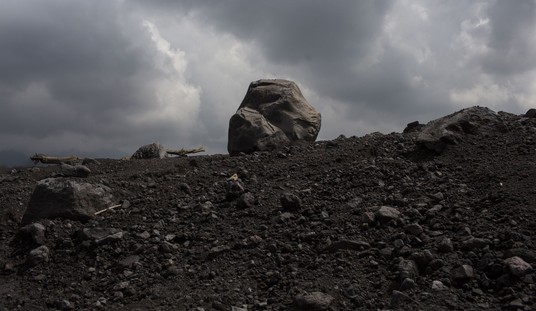Republicans in Congress advanced against the EPA and the Obama administration’s energy policy on two fronts today. In the House, the Energy and Commerce Committee approved a bill to stop the EPA from implementing regulations to enforce its finding on carbon dioxide emissions as a pollutant. The bill will certainly pass the House, and might pass the Senate as well:
Lawmakers approved a bill to block Environmental Protection Agency (EPA) regulations on carbon dioxide emissions in a key House subcommittee, Thursday.
The House Energy and Commerce Committee’s Energy and Power Subcommittee voted in favor of the bill with a voice vote along party lines. No amendments were offered, and so far there is no word on when the full committee and House will take up the measure.
In the debate leading up to the vote, Republicans attempted to frame the legislation as a measure that would stop job-killing regulations they argue contribute to high gas prices. Democrats, on the other hand, blasted the bill, calling it extreme, and saying it would roll back reasonable EPA efforts to control dangerous greenhouse gas emissions that contribute to climate change.
Barack Obama has threatened to veto any bill that restricts the EPA from enforcing that finding, and it may well come to that. A few Democrats in the Senate want the EPA reined in as well, notably Jay Rockefeller, who has already proposed a two-year moratorium. Other Senators in red states, such as Ben Nelson in Nebraska and Claire McCaskill in Missouri, might decide that they’ll push off the onus of stopping the bill onto Obama and let him take the heat in the 2012 election. Harry Reid may have to generate a filibuster to prevent that from happening.
That may not be the biggest development, though. The Congressional Research Service (CRS) has issued a report that claims that the US has far more recoverable reserves in oil and natural gas than previously thought:
U.S. proved reserves of oil total 19.1 billion barrels, reserves of natural gas total 244.7 trillion cubic feet, and natural gas liquids reserves of 9.3 billion barrels. Undiscovered technically recoverable oil in the United States is 145.5 billion barrels, and undiscovered technically recoverable natural gas is 1,162.7 trillion cubic feet. The demonstrated reserve base for coal is 488 billion short tons, of which 261 billion short tons are considered technically recoverable. …
Proved reserves are those amounts of oil, natural gas, or coal that have been discovered and defined, typically by drilling wells or other exploratory measures, and which can be economically recovered. In the United States, proved reserves are typically measured by private companies, who report their findings to the Securities and Exchange Commission because they are considered capital assets. In addition to the volumes of proved reserves are deposits of oil and gas that have not yet been discovered, which are called undiscovered resources. The term has a specific meaning: undiscovered resources are amounts of oil and gas estimated to exist in unexplored areas. If they are considered to be recoverable using existing production technologies, they are referred to as undiscovered technically recoverable resources (UTRR). In-place resources are intended to represent all of the oil, natural gas, or coal contained in a formation or basin without regard to technical or economic recoverability.
Jim Inhofe briefed the Senate on these findings in a floor speech earlier today:
My message today is simply this: higher gas prices-indeed, higher prices for the energy we use – are an explicit policy goal of the Obama Administration. Let me put it another way: the Obama Administration is attacking affordable energy.
By stopping the President’s costly cap-and-trade rules, we will also remove a significant barrier to developing America’s energy resources. You see, the cap-and-trade agenda is also about energy austerity. The hope is that if we restrict enough supply, the price will increase, and we can then simply shift to less costly alternatives. Yet this is wishful thinking.
We have, in fact, 163 billion barrels of recoverable oil-nearly six times higher than what President Obama and the Democrats like to claim. Let’s think about 163 billion barrels for a moment: that is enough to maintain our current levels of production and replace our imports from the Persian Gulf for more than 50 years.
But oil resources offer only a glimpse of the full picture. As I noted earlier, CRS found that America’s combined recoverable natural gas, oil, and coal endowment is the largest on Earth. It’s far larger than that of Saudi Arabia, China, and Canada combined.
Opponents of domestic production in oil and gas claim we cannot drill our way out of the energy crisis and our dependence on imported oil. However, the findings certainly suggest that we can in fact do so, and that we can make that solution last for a very long time. Even on its own, those reserves would last 22 years if we stopped all current areas of American production. Furthermore, we’re likely to find more as we take the leash off of exploration.
It’s time to start acting like adults. We need to use oil, and we have plenty under our feet. Let’s start using it instead of putting cash into the pockets of unstable and unfriendly regimes.








Join the conversation as a VIP Member